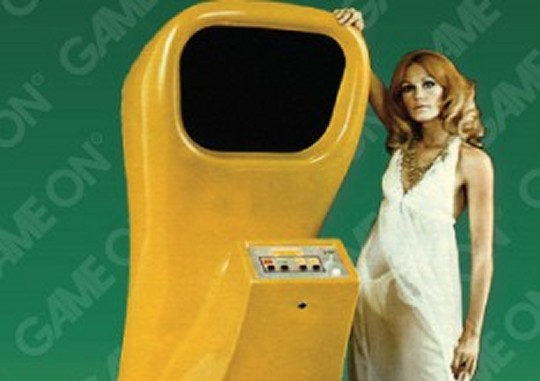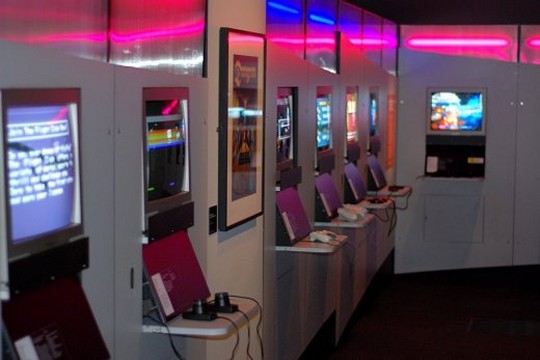|
SEQUEL IN A TOILET
I know it's serious
This is the keynote
speech I gave on the opening day of the inaugural Game On
exhibition at the Barbican arts centre in London in May 2002 (the
exhibition has since toured the world, and as far as I know is still
doing so). Three of us spoke in the gallery's lecture theatre - developer and hugely lovely industry
uncle Charles
Cecil, myself, and then a woman whose name and identity I've
since embarrassingly forgotten. I think she was some sort of
psychologist. My piece addressed the wider cultural and artistic
merit of gaming in 2002, a theme I've
subsequently
returned to here on WoS. It went down pretty well on the day,
generating most of the questions in the Q&A session that followed,
and looking back I'm fairly pleased with the accuracy/foresight of
the speech a hardware generation later, especially with regard to
the PC and handheld markets. The Barbican, I established in my short introductory
preamble, has really small
toilets.

If you were to hold this exhibition again 20 years from now, looking back over the period from now until then, chances are
that it wouldn't occupy
the 2000 square feet of floorspace it's using today. The chances are
that you could do it perfectly adequately in one of the cubicles in the toilets. Because if the games industry continues along its current path, you’d only need to show the visitors about six games. There’d be a fighting game, a racing game, a Tomb Raider-style 3D adventuring game, a football game, a resource-management strategy game and a role-playing game. Around you there are hundreds of different videogames, but more than that, most of them represent different ideas. And
at the moment, ideas are what the videogames industry is right out of.
This exhibition couldn’t be better timed, because the games industry has just reached its biggest crossroads in 20 years. With every generational shift in videogaming hardware in those two decades, we’ve seen an exponential increase in the cost of making games. It’d probably be fair to say as a very rough rule of thumb that the cost of making the average game doubles with every new generation of hardware. However, until now, that cost could be absorbed with a big price hike. When we moved from the 8-bit Spectrum and the Commodore 64, to the 16-bit Amiga and Atari ST, prices jumped from about £6-10 to £20-25. When gaming moved on from there to the new consoles like the Mega Drive and Super Nintendo, prices jumped from £25 to £45-£50.
And when we moved from there to the 32-bit era of the Playstation, Saturn, prices stayed about the same but games came on CD rather than cart, which gave the publishers an extra £10 of profit. But the new generation of hardware brings with it massively increased costs again, but nothing to offset them against. Indeed, the public’s attitude towards the price of games machine has hardened, with the result that console firms have to take a huge loss in the first place just to get into the market. It’s said that Microsoft were losing £50 on every Xbox sold when they launched it, and that was before they had to cut the price by £100 a couple of weeks later to stimulate sales.

You may have read that the videogames
industry rakes in ever-greater amounts of money every year, more
than the movie or record industries and all the rest of it. And it’s
true, it does take in more money every year. The problem is that it
has to keep spending even more money to generate that revenue, to
the point where the worldwide games industry, taken as a whole, LOST
well over a billion dollars last year. Roughly two out of every three games companies
actually loses money. It’s no wonder that the two things the industry’s
trade representative body spends most of its time doing are running around telling everyone what a great job the games industry is doing for the economy, and running to the government asking for subsidies to stop it going bankrupt.
Now I’m sure none of you came here for an economics lecture. But the reason that in 20 years time you could hold this exhibition in a toilet cubicle is that those
same economics are strangling videogames, in terms of being
something worth holding an exhibition about, to death. The way things are going, what we have here in Game On is a wake. It costs a million pounds to make the average game, and for that million pounds you’re almost certainly going to get a VERY average game. To make one of the smash hits that makes all the money, you’re going to have to multiply that by anything from three to fifty. That means that the means of producing a commercial videogame rest solely in the hands of, basically, old fat guys in suits, that legendary demographic of creative driving force.
Almost all art is the product of a single individual’s vision. Someone who has an idea in any of the other creative media can bring it to fruition more or less on their own. You can write a best-selling
novel with nothing but a typewriter. You can make a Number One record in your bedroom on equipment costing a few hundreds, or even tens, of pounds. Even movies are relatively attainable – the Blair Witch Project was famously successful having been made on a budget of about £50,000, and while that’s an exception, you can still make a commercially-competitive and viable movie for far less than your average videogame.

The upshot of all this is that videogaming
today is, by an enormous margin, the most conservative and least interesting of all the
worlds of creative artistic endeavour. When games cost 40 pounds
each, you’re not going to sell them to the casual passer-by. Most
people buy fewer than six games a year, and at that kind of money
they’re not going to take any risks. Hence the only games you can
make are the six games in our imaginary toilet in 2022, and by doing
that you narrow your market even further, because the creative stagnation puts outsiders off. Hence it gets even harder to make anything interesting, hence your market gets more and more conservative in a terrible vicious circle.
(The industry, in fact, secretly longs for the days of knocked-out simple games at high prices.
Look how they’ve jumped on the GBA bandwagon even though hardly any GBA games actually sell
- it's the only machine that competes with PC for volume of releases, yet sales and margins are teeny.
For all but the biggest publishers, their only hope for the future
may be to live in an eternally-delayed adolescence of handhelds a
generation behind the cutting edge.)
Occasionally a phenomenon occurs, like the first Playstation, that captures the general public’s imagination and opens up the possibility of change. But the business is so inherently conservative, and so slow-moving, that by the time anyone could take advantage, the novelty’s worn off, the general public is going
“But that game’s the same as the last one you sold me, I’m not giving you 40 quid for it again”, and we’re back to the same old people buying the same old games and the same old vicious circle.
As a result of this, you may hear the games industry complaining from time to time that it isn’t taken seriously as an art form. That’s true, and there’s a very good reason for it:
games aren’t art.
Occasionally, the games industry releases a vanity project, such as Rez or Ico, which are acclaimed as marking a new artistic maturity, because they’re slower-moving or weirder-looking than a normal game. But to acclaim these games as art is to operate in the same narrow perspective as calling “Saving Private Ryan” art compared to “The Longest Day”. Yes, one of those movies might start and end with sentimental scenes of an old man crying in a graveyard while a flag flutters poignantly and sad orchestral music plays in the background, but basically both films are about the exact same thing – explosions, blood and death, and it’s purely a critical conceit to pretend anything else. Rez and Ico might have been inspired by Kandinsky’s
theory of synaesthesia and French arthouse movies respectively, but in Rez you still just move around the screen pressing the fire button frantically to shoot bad guys, and in Ico you still just walk from place to place pulling levers to open doors and hitting monsters with a stick.

Games aren’t art, and more importantly if a game is any good at all it can NEVER be art, because art is about emotional involvement and emotional involvement and control rarely go hand in hand. A film is scary because the dumb teens split up to search the spooky woods when YOU know there’s an axe-wielding psycho there. Drama is affecting because YOU know that Person A is supposed to be with Person B, but circumstances and misunderstandings contrive to keep them apart. But in a game, you could stop the teens splitting up. In a game, you could stop Ilsa from flying out of Casablanca. When you give the viewer control, you surrender the ability to give them any more emotional involvement than making them jump from time to time when a zombie leaps out of a cupboard at them. It’s the artistic, emotional and intellectual equivalent of sneaking up behind someone and jabbing them in the arse with a hat pin. It’ll certainly evoke an emotional reaction, it may well be entertaining and funny, but you’re not going to win the Turner Prize for it.
This, fundamentally, is why games
aren’t respected as an art form. This is why you never see any
movement of personnel between the games industry and the other
creative industries, except occasionally at the financial level.
No-one ever moves from making games to directing movies. No-one ever
moves from writing videogame music to writing chart-topping pop.
No-one ever moves from editing a videogame magazine to editing any
kind of proper grown-up magazine (which is obviously a bit of a
bummer for me personally). Games get no respect because they’re embarrassed about what they are, and I hate to see that because videogames are great.
So what I personally hope this exhibition is about are the possibilities of the medium. Which is to say the potential for games to have artistic merit not because they’re movies that you occasionally get to direct, not because they’re replications of every last mathematical detail of some real-life event, but because they’re games. This exhibition showcases games that were a success because they didn’t try to be anything else. Let’s hope that they DON’T have to hold the next Game On in a toilet.

|

